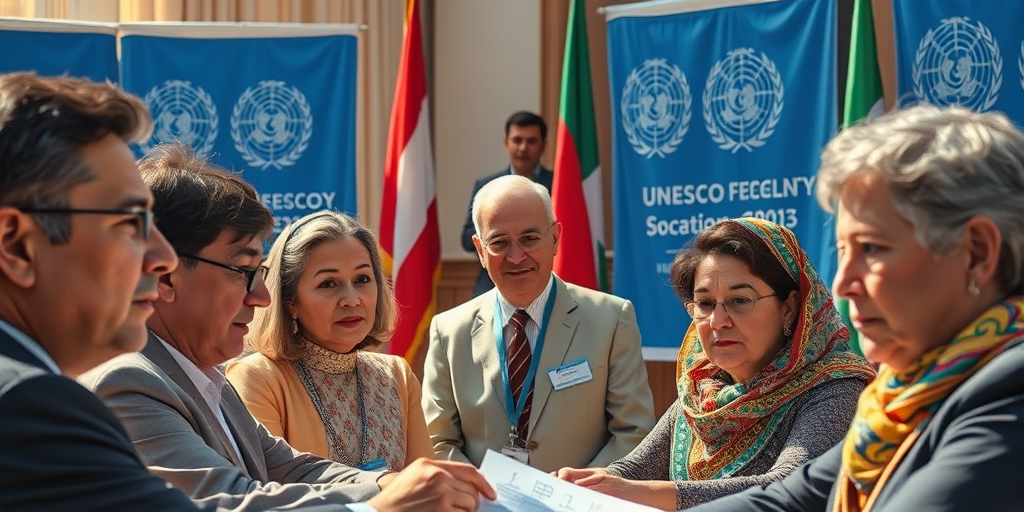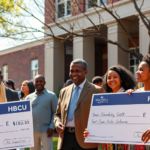UNESCO and Partners Reaffirm Commitment to Gender Equality at Samarkand Conference
In a bold assertion of commitment to gender equality, UNESCO and the Government of Uzbekistan hosted a significant side event, “Promoting Gender Equality through Multilateral Collaboration,” during the 43rd session of the UNESCO General Conference in Samarkand. This event underscored UNESCO’s resolve to advance gender equality across the sectors of science, culture, communication, and information, signaling impactful changes for communities involved in these fields globally.
A Renewed Vision for Gender Equality
Audrey Azoulay, UNESCO’s Director-General, emphasized the organization’s efforts to dismantle gender biases, highlighting an achievement of reaching over 27 million learners in the past two years through educational reforms. “Our report shows that together, we have truly made a difference for gender equality,” Azoulay remarked, referencing the newly unveiled report “UNESCO in Action for Gender Equality: 2024–2025.” The report showcases UNESCO’s strides in creating inclusive environments, especially highlighting efforts in supporting women in science and safeguarding digital and physical spaces for women.
Deputy Prime Minister of Uzbekistan, H.E. Zulaykho Makhkamova, introduced a publication titled “Women. History. Civilization,” celebrating the contributions of Uzbek women throughout history and underscoring current initiatives to empower women. “Peace, justice, and progress are only possible when women lead. We are proud to advance their empowerment,” stated Makhkamova.
Local Impact and Community Interest
For communities in the United States and globally, these commitments hold particular resonance, offering a blueprint for advancing gender equality locally. By fostering educational and professional environments that encourage women’s involvement, similar strategies can be replicated to benefit various local settings, impacting residents positively.
Local community organizations, such as the Women’s Advocacy Group based in Washington, D.C., view these initiatives as critical steps for inspiration. “UNESCO’s global influence can help mobilize local leaders to adopt gender-inclusive policies, enhancing opportunities right here in our neighborhoods,” commented Jane Fields, the organization’s spokesperson.
Emphasizing Supportive Ecosystems
A key highlight of the event was a panel discussion featuring distinguished UNESCO laureates. These laureates shared their experiences and reiterated the need for supportive ecosystems to empower women in education, science, and culture. They noted persistent barriers, such as restricted access to resources and professional networks, urging UNESCO to foster supportive environments that nurture women’s potential from an early age.
Voline Ogutu, a laureate from Kenya and winner of the UNESCO-Netflix Short Film Competition, highlighted the transformative power of recognition and the need for accessible funding in creative industries. “UNESCO can help women filmmakers in Africa by improving their access to funding and loans, since cultural and inheritance barriers often prevent them from owning assets or securing financial support,” she suggested.
Learning From UNESCO’s Approach
UNESCO’s approach, particularly its awards, plays a significant role in empowering women globally by providing international recognition and facilitating collaboration. This can inspire U.S.-based organizations to consider similar frameworks to uplift women in science and arts.
“The international recognition from UNESCO is a testament that not only enhances career opportunities for women but also strength advocacy capacities on global platforms,” Prof. Alicia Kowaltowski from Brazil stated. This perspective offers potential pathways for local entities to harness the power of recognition in professional and community settings.
Recommendations for Future Initiatives
Panelists offered practical recommendations for UNESCO, emphasizing inclusion in technology development, policy-science integration, and fostering early education in STEM fields. These recommendations align closely with local initiatives in various parts of the U.S., where technology engagement for young girls and STEM education programs are gaining momentum.
Maya Moussa from Lebanon highlighted, “UNESCO can make a real difference by starting early—ensuring every preschool teacher tells girls they can become engineers, mathematicians, or IT specialists.” Such foundational shifts could profoundly impact the societal perceptions of what girls can achieve, potentially revolutionizing future educational and professional landscapes in local contexts.
Long-term Implications
With UNESCO’s reinforcement of gender equality intertwined with its sustainable development goals, communities worldwide can anticipate enhanced collaborative efforts that bridge gaps in gender equality, creating prosperous avenues for women. The engagement shown at Samarkand promises to energize a renewed commitment that accelerates progress in gender-responsive policies and equitable opportunities within local and global arenas.
Continued discourse and implementation of these actions will remain critical, considering the continuing challenges posed by socio-economic shifts, climate impact, and geopolitical factors. Locally, resources such as community workshops are being designed to align understanding and execution of gender-inclusive policies, ensuring that the momentum gained by such international conferences translates to actionable outcomes on the ground.
In conclusion, UNESCO’s reaffirmation at the Samarkand conference represents an inspirational milestone for gender equality, resonating deeply within local spheres by encouraging actionable strategies that promote inclusiveness, empower residents, and foster community interest across diverse settings.







